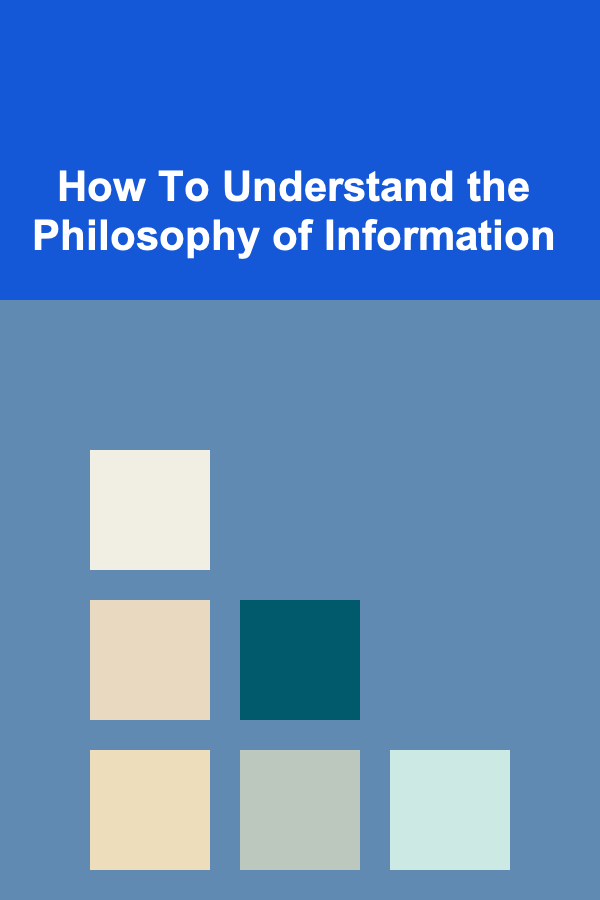
How To Understand the Philosophy of Information
ebook include PDF & Audio bundle (Micro Guide)
$12.99$6.99
Limited Time Offer! Order within the next:

The philosophy of information is an interdisciplinary field that blends elements from philosophy, information theory, computer science, and epistemology. It examines the nature of information, its acquisition, transmission, processing, and how it influences our understanding of the world. While the study of information as a concept is not new, its philosophical implications have gained significant attention with the advent of digital technology, the internet, and artificial intelligence. This essay aims to explore the central tenets of the philosophy of information, its key ideas, and how it helps us understand the world and our place within it.
What is Information?
At its core, information is often seen as data that is processed, organized, or structured to have meaning. It plays a pivotal role in virtually every field, from communication to science, technology, art, and ethics. The philosopher Luciano Floridi, one of the leading figures in the philosophy of information, defines information as "that which makes a difference to the observer." This definition emphasizes that information is context-dependent and is only meaningful in relation to the observer or the system receiving it.
To understand the philosophy of information, we must first explore various interpretations of what "information" truly is. The classical view of information, often associated with the information theory of Claude Shannon, treats information as a quantitative entity, something that can be measured and transmitted through communication channels. Shannon's model focuses on the technical aspects of information transmission, emphasizing the importance of reducing uncertainty in communication.
However, this perspective is not sufficient for fully understanding the nature of information. It does not address how information affects knowledge, consciousness, or how we interpret the world around us. This is where the philosophy of information diverges from traditional information theory and explores the qualitative and epistemological dimensions of information.
The Historical Development of the Philosophy of Information
The philosophy of information is a relatively recent field of inquiry. However, its roots can be traced back to several key intellectual traditions:
- Ancient and Medieval Philosophy: Early philosophers like Plato and Aristotle grappled with the concept of knowledge, truth, and representation, all of which are central to the modern philosophy of information. Plato's "Theory of Forms" is especially relevant because it suggests that information is an abstract entity that exists independently of the material world. Aristotle, in contrast, emphasized the importance of categorizing and systematizing information to better understand the natural world.
- Early Modern Philosophy: The development of epistemology in the 17th and 18th centuries laid the groundwork for later discussions of information. René Descartes' cogito argument ("I think, therefore I am") marked the beginning of a shift towards subjectivity and the role of the observer in the production of knowledge. Immanuel Kant, with his theory of knowledge, posited that our understanding of the world is mediated by the mental categories and structures through which we process information.
- The 20th Century and Information Theory: The advent of modern computing and communication technologies during the 20th century led to a new understanding of information. Claude Shannon's work on information theory revolutionized how we think about the transmission and encoding of information. The increasing influence of computers, digital media, and the internet further pushed the philosophy of information into the foreground.
Key Questions in the Philosophy of Information
The philosophy of information addresses several fundamental questions, which are essential to understanding its nature:
1. What is the nature of information?
The first question that arises in the philosophy of information is: What is the true nature of information? Is it something that exists independently of the observer, like a physical object, or is it a construct of human cognition? Is information intrinsic to the world, or does it only exist when it is perceived or interpreted by conscious beings?
In trying to answer this, philosophers have proposed two major perspectives:
- Realism: Realists argue that information exists independently of human perception. It is an objective part of the world, waiting to be discovered and processed. This aligns with the scientific worldview, where information about the universe exists whether or not there are beings to perceive it.
- Constructivism: Constructivists argue that information is only meaningful when it is interpreted by conscious beings. According to this view, information is inherently tied to the cognitive processes of observers. Without an observer to assign meaning, raw data or signals cannot be considered "information."
2. What is the relationship between information and knowledge?
One of the central concerns of the philosophy of information is the relationship between information and knowledge. Information is often seen as the raw material or building block of knowledge, but it is not synonymous with knowledge. The distinction between information and knowledge is crucial for understanding how we acquire, process, and use information.
- Information vs. Knowledge: Information consists of facts or data that are devoid of context, meaning, or interpretation. Knowledge, on the other hand, involves the understanding and interpretation of information. It requires cognitive processes such as reasoning, analysis, and judgment to transform raw information into something meaningful. Thus, information becomes knowledge only when it is processed and understood within a specific context.
- Epistemology of Information: The study of how information leads to knowledge falls under epistemology, the branch of philosophy concerned with the nature and scope of knowledge. Philosophers like Edmund Gettier have pointed out that simply having true beliefs (which may be based on information) is not sufficient for having knowledge. Knowledge requires justified belief, and the justification comes from understanding how the information fits into a larger framework of meaning.
3. How does information shape reality?
Another key question in the philosophy of information concerns the role of information in shaping our perception of reality. How does information influence how we interpret the world, and how does it impact our social, political, and cultural realities?
- Constructivist Theories of Reality: According to some philosophers, reality is constructed through the information we receive and how we process it. For example, the concept of "social constructionism" argues that much of what we take for granted as objective reality is, in fact, a product of social processes and shared information. Language, culture, and social norms all play a significant role in shaping how information is interpreted and how it affects our worldview.
- The Role of Media and Technology: With the rise of digital technologies and mass media, the influence of information on reality has become even more pronounced. The internet, social media, and algorithms have created new ways of disseminating and manipulating information, influencing how we see the world. The rise of "fake news" and misinformation has raised important philosophical questions about the integrity of information and its role in shaping our understanding of reality.
4. What ethical concerns arise from the philosophy of information?
Ethics and information are tightly intertwined, especially in the digital age. The vast amounts of data being generated and shared today have raised questions about privacy, consent, and the responsible use of information. Several ethical issues are central to the philosophy of information:
- Privacy and Surveillance: The collection and use of personal data raise significant ethical concerns. How much information should individuals be required to share, and how should their privacy be protected? The philosophy of information interrogates the ethics of surveillance and the power dynamics involved in controlling access to personal data.
- Information and Power: Information is not neutral; it can be used to control, manipulate, or empower individuals and groups. The distribution and accessibility of information have profound political implications. The philosophy of information asks how power dynamics affect the flow of information and the extent to which certain groups can control or shape the information environment.
- Misinformation and Truth: The proliferation of misinformation and disinformation is a pressing ethical issue. The philosophy of information examines how false information is disseminated, its impact on society, and the moral responsibility of those who create, share, or consume information.
The Role of Information in Technology and Artificial Intelligence
In addition to its philosophical implications, the concept of information plays a crucial role in the development of technology, particularly artificial intelligence (AI). AI systems process vast amounts of information to "learn" and make decisions, but this raises important questions about how information is represented and interpreted by machines.
- Machine Learning and Knowledge Representation: One of the central challenges in AI is understanding how machines process and represent information. Philosophers and computer scientists debate how machines can be made to "understand" information, as opposed to simply processing it. Can machines truly "know" something, or are they simply manipulating symbols?
- Ethical Implications of AI: The use of AI also raises significant ethical questions. How should AI systems be programmed to handle information in a morally responsible way? Who is accountable when AI systems make decisions based on biased or incomplete information? The philosophy of information offers important insights into how we can develop ethical frameworks for AI and information technologies.
Conclusion
The philosophy of information is an exciting and rapidly evolving field that touches on a wide range of intellectual and practical concerns. It challenges us to think critically about what information is, how it shapes our knowledge and reality, and how it impacts our ethical decisions and technological innovations. As our society becomes increasingly dependent on information, understanding its philosophical implications will become ever more important for navigating the complexities of the digital age.
In the end, the philosophy of information teaches us that information is not just a neutral commodity, but a force that shapes our perceptions, our societies, and our futures. By reflecting on the nature of information, we can gain deeper insights into how we understand the world and, ultimately, how we engage with the universe around us.
Reading More From Our Other Websites
- [Beachcombing Tip 101] Best Sustainable Packing List for Multi‑Day Beachcombing Trips in Remote Archipelagos
- [Home Budget 101] How to Create a Debt-Free Home Budget
- [Home Soundproofing 101] How to Use Foam Insulation to Soundproof Your Home
- [Personal Investment 101] How to Invest in Precious Metals as a Hedge Against Inflation
- [Beachcombing Tip 101] Marine Marvels: Rare Creatures and Materials That Make the Sea a Treasure Trove
- [Personal Care Tips 101] How to Choose a Deodorant That Is Travel-Friendly and Compact
- [Personal Care Tips 101] How to Choose Acne Treatment Creams That Won't Interfere with Makeup
- [Home Holiday Decoration 101] How to Master the Art of Holiday Decorating with Cinnamon Sticks: A Complete Guide
- [Home Space Saving 101] How to Organize Small Living Spaces for Maximum Functionality
- [Home Staging 101] How to Choose a Home Stager That Specializes in Luxury Properties: A Guide

How to Invest in Cryptocurrencies Safely and Wisely
Read More
How to Pet-Proof Your Kitchen for Safety
Read More
The Step-by-Step Guide to Homebrewing Coffee
Read More
Interpreting EV User Interfaces and Features: A Comprehensive Guide
Read More
10 Tips for Starting an Adult Coloring Book Collection
Read More
10 Tips for Optimizing Your Errands with Technology
Read MoreOther Products

How to Invest in Cryptocurrencies Safely and Wisely
Read More
How to Pet-Proof Your Kitchen for Safety
Read More
The Step-by-Step Guide to Homebrewing Coffee
Read More
Interpreting EV User Interfaces and Features: A Comprehensive Guide
Read More
10 Tips for Starting an Adult Coloring Book Collection
Read More